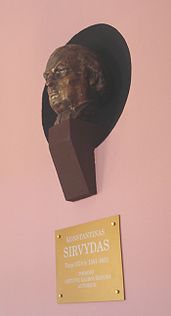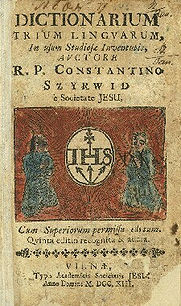
Konstantinas Sirvydas
Encyclopedia


Lithuania
Lithuania , officially the Republic of Lithuania is a country in Northern Europe, the biggest of the three Baltic states. It is situated along the southeastern shore of the Baltic Sea, whereby to the west lie Sweden and Denmark...
n religious preacher, lexicographer and one of the pioneers of Lithuanian literature
Lithuanian literature
Lithuanian literature concerns the art of written works compiled by Lithuanians throughout their history.-Latin language:A wealth of Lithuanian literature was written in Latin, the main scholarly language in the Middle Ages.-Lithuanian language:...
from the Grand Duchy of Lithuania
Grand Duchy of Lithuania
The Grand Duchy of Lithuania was a European state from the 12th /13th century until 1569 and then as a constituent part of Polish-Lithuanian Commonwealth until 1791 when Constitution of May 3, 1791 abolished it in favor of unitary state. It was founded by the Lithuanians, one of the polytheistic...
, at the time a confederal part of the Polish-Lithuanian Commonwealth
Polish-Lithuanian Commonwealth
The Polish–Lithuanian Commonwealth was a dualistic state of Poland and Lithuania ruled by a common monarch. It was the largest and one of the most populous countries of 16th- and 17th‑century Europe with some and a multi-ethnic population of 11 million at its peak in the early 17th century...
. He was a Jesuit priest and a professor at the Academia Vilnensis
Vilnius University
Vilnius University is the oldest university in the Baltic states and one of the oldest in Eastern Europe. It is also the largest university in Lithuania....
and he authored, among other works, the first grammar
Grammar
In linguistics, grammar is the set of structural rules that govern the composition of clauses, phrases, and words in any given natural language. The term refers also to the study of such rules, and this field includes morphology, syntax, and phonology, often complemented by phonetics, semantics,...
of the Lithuanian language
Lithuanian language
Lithuanian is the official state language of Lithuania and is recognized as one of the official languages of the European Union. There are about 2.96 million native Lithuanian speakers in Lithuania and about 170,000 abroad. Lithuanian is a Baltic language, closely related to Latvian, although they...
and the first tri-lingual dictionary
Dictionary
A dictionary is a collection of words in one or more specific languages, often listed alphabetically, with usage information, definitions, etymologies, phonetics, pronunciations, and other information; or a book of words in one language with their equivalents in another, also known as a lexicon...
in Lithuanian, Latin
Latin
Latin is an Italic language originally spoken in Latium and Ancient Rome. It, along with most European languages, is a descendant of the ancient Proto-Indo-European language. Although it is considered a dead language, a number of scholars and members of the Christian clergy speak it fluently, and...
and Polish
Polish language
Polish is a language of the Lechitic subgroup of West Slavic languages, used throughout Poland and by Polish minorities in other countries...
(1619). Famous for his eloquence
Eloquence
Eloquence is fluent, forcible, elegant or persuasive speaking. It is primarily the power of expressing strong emotions in striking and appropriate language, thereby producing conviction or persuasion...
10 years in a row he was preaching sermons in St. John's church in Vilnius twice a day - once Lithuanian, and once Polish.
He was born in Lithuania some time between 1578 and 1581, in the village of Širvydai near Anykščiai
Anykšciai
Anykščiai is a ski resort town in Lithuania, 20 miles west of Utena. The Roman Catholic Church of St. Matthias in Anykščiai is the tallest church in Lithuania, with spires measuring 79 meters in height.The city has a football club FK Anykščiai.-Name:...
. In 1612, he became a professor of theology
Theology
Theology is the systematic and rational study of religion and its influences and of the nature of religious truths, or the learned profession acquired by completing specialized training in religious studies, usually at a university or school of divinity or seminary.-Definition:Augustine of Hippo...
at the Academia Vilnensis, the predecessor of Vilnius University
Vilnius University
Vilnius University is the oldest university in the Baltic states and one of the oldest in Eastern Europe. It is also the largest university in Lithuania....
. Between 1623 and 1624, he also briefly served as the deputy rector
Rector
The word rector has a number of different meanings; it is widely used to refer to an academic, religious or political administrator...
of his alma mater
Alma mater
Alma mater , pronounced ), was used in ancient Rome as a title for various mother goddesses, especially Ceres or Cybele, and in Christianity for the Virgin Mary.-General term:...
, after which he continued as a professor in theology, liberal arts
Liberal arts
The term liberal arts refers to those subjects which in classical antiquity were considered essential for a free citizen to study. Grammar, Rhetoric and Logic were the core liberal arts. In medieval times these subjects were extended to include mathematics, geometry, music and astronomy...
and philosophy
Philosophy
Philosophy is the study of general and fundamental problems, such as those connected with existence, knowledge, values, reason, mind, and language. Philosophy is distinguished from other ways of addressing such problems by its critical, generally systematic approach and its reliance on rational...
.
At the same time, he began his career as a preacher, writer and scientist. First edition before 1620 - fifth in 1713, he published his tri-lingual Polish-Lithuanian-Latin dictionary Dictionarium trium linguarum in usum studiosae juventutis, one of the first such books in Lithuanian literary history. It has been printed in at least five editions since that time. First and later editions slightly differed. Editions Until the 19th century, it was the only Lithuanian dictionary in print. Sirvydas' lexicon
Lexicon
In linguistics, the lexicon of a language is its vocabulary, including its words and expressions. A lexicon is also a synonym of the word thesaurus. More formally, it is a language's inventory of lexemes. Coined in English 1603, the word "lexicon" derives from the Greek "λεξικόν" , neut...
is often mentioned as a milestone in the standardization and codification of the Lithuanian language. The first edition contained approximately 6000 words, the second was expanded to include almost 11,000 words. It also had a lot of newly created Lithuanian words - for example mokytojas (teacher), taisyklė (rule), kokybė (quality).
A decade later, in 1629, he published the first volume of a collection of his sermon
Sermon
A sermon is an oration by a prophet or member of the clergy. Sermons address a Biblical, theological, religious, or moral topic, usually expounding on a type of belief, law or behavior within both past and present contexts...
s entitled Punktai Sakymų, and he later translated them into the Polish language as Punkty kazań. The Lithuanian version of this work was often used as a primer to teach the Lithuanian language. However, it was not until 1644, that the second volume was finally published. Around 1630, he compiled the first book of grammar of the Lithuanian language (Lietuvių kalbos raktas – Key to the Lithuanian Language), which however did not survive to our times. He died from tuberculosis on August 8, 1631 in Vilnius
Vilnius
Vilnius is the capital of Lithuania, and its largest city, with a population of 560,190 as of 2010. It is the seat of the Vilnius city municipality and of the Vilnius district municipality. It is also the capital of Vilnius County...
.

